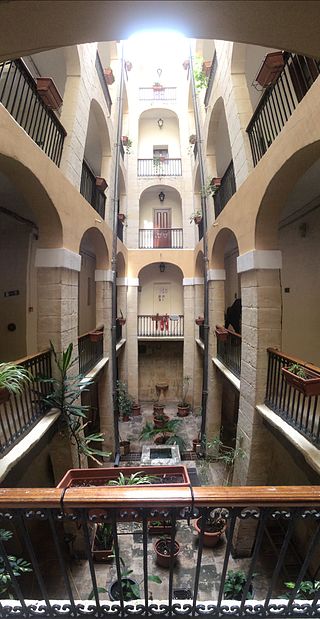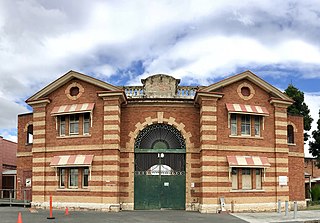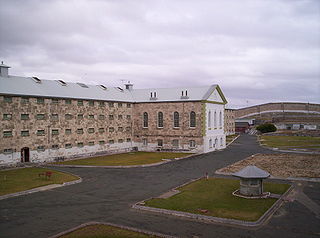Related Research Articles

The prison-industrial complex (PIC) is a term, coined after the "military-industrial complex" of the 1950s, used by scholars and activists to describe the many relationships between institutions of imprisonment and the various businesses that benefit from them.

The prison abolition movement is a network of groups and activists that seek to reduce or eliminate prisons and the prison system, and replace them with systems of rehabilitation and education that do not focus on punishment and government institutionalization. The prison abolitionist movement is distinct from conventional prison reform, which is intended to improve conditions inside prisons.

A debtors' prison is a prison for people who are unable to pay debt. Until the mid-19th century, debtors' prisons were a common way to deal with unpaid debt in Western Europe. Destitute people who were unable to pay a court-ordered judgment would be incarcerated in these prisons until they had worked off their debt via labour or secured outside funds to pay the balance. The product of their labour went towards both the costs of their incarceration and their accrued debt. Increasing access and lenience throughout the history of bankruptcy law have made prison terms for unaggravated indigence obsolete over most of the world.

H.M. Prison Brisbane, more commonly known as Boggo Road Gaol, was Queensland's main prison from the 1880s to the 1980s. By the time it closed, it had become notorious for poor conditions and rioting. Located on Annerley Road in Dutton Park, an inner southern suburb of Brisbane, it is the only surviving intact gaol in Queensland that reflects penological principles of the 19th century. After closing in 1992, the larger 1960s section was demolished, leaving the heritage listed section.
Cornelia Rau is a German and Australian citizen who was unlawfully detained for a period of ten months in 2004 and 2005 as part of the Australian Government's mandatory detention program.

Critical Resistance is a U.S. based organization with the stated goal of dismantling what it calls the prison-industrial complex (PIC). Critical Resistance's national office is in Oakland, California, with three additional chapters in New York City, Los Angeles, and Portland, Oregon.

Prostitution in Australia is governed by state and territory laws, which vary considerably, although none ban prostitution outright.

Drug liberalization is a drug policy process of decriminalizing or legalizing the use or sale of prohibited drugs. Variations of drug liberalization include drug legalization, drug relegalization, and drug decriminalization. Proponents of drug liberalization may favor a regulatory regime for the production, marketing, and distribution of some or all currently illegal drugs in a manner analogous to that for alcohol, caffeine and tobacco.
A community legal centre (CLC) is the Australian term for an independent not-for-profit organisation providing legal aid services, that is, provision of assistance to people who are unable to afford legal representation and access to the court system. They provide legal advice and traditional casework for free, primarily funded by federal, state and local government. Working with clients who are mostly the most disadvantaged and vulnerable people in Australian society, they also work with other agencies to address related problems, including financial, social and health issues. Their functions may include campaigning for law reform and developing community education programs.

A prison, also known as a jail, gaol, penitentiary, detention center, correction center, correctional facility, or remand center, is a facility where people are confined against their will and denied a variety of freedoms under the authority of the state, generally as punishment for various crimes. Authorities most commonly use prisons within a criminal-justice system: people charged with crimes may be imprisoned until their trial; those who have pled or been found guilty of crimes at trial may be sentenced to a specified period of imprisonment.

Lesbian, gay, bisexual, transgender and queer (LGBTQ) people face difficulties in prison such as increased vulnerability to sexual assault, other kinds of violence, and trouble accessing necessary medical care. While much of the available data on LGBTQ inmates comes from the United States, Amnesty International maintains records of known incidents internationally in which LGBTQ prisoners and those perceived to be lesbian, gay, bisexual or transgender have suffered torture, ill-treatment and violence at the hands of fellow inmates as well as prison officials.
Liberty Victoria, officially the Victorian Council for Civil Liberties (VCCL) and formerly Australian Council for Civil Liberties (ACCL), is a civil liberties group based in Victoria, Australia.
Indigenous Australians are both convicted of crimes and imprisoned at a disproportionately higher rate in Australia, as well as being over-represented as victims of crime. As of September 2019, Aboriginal and Torres Strait Islander prisoners represented 28% of the total adult prisoner population, while accounting for 2% of the general adult population. Various explanations have been given for this over-representation, both historical and more recent. Federal and state governments and Indigenous groups have responded with various analyses, programs and measures.

Punishment in Australia arises when an individual has been accused or convicted of breaking the law through the Australian criminal justice system. Australia uses prisons, as well as community corrections. When awaiting trial, prisoners may be kept in specialised remand centres or within other prisons.

The Legal Aid, Sentencing and Punishment of Offenders Act 2012 (LASPO) is a statute of the Parliament of the United Kingdom enacted by the coalition government of 2010-2015, creating reforms to the justice system. The bill for the act was introduced in the House of Commons on 21 June 2011, and received Royal Assent on 1 May 2012.

Justice Action is a not-for-profit community organisation based in Sydney, Australia. Justice Action focuses on abuses of authority in the criminal justice and mental health systems in Australia. Founded in 1979 as Prisoner Action, Justice Action is independent of the Australian government and is funded by voluntary donations and the work of the social enterprise, Breakout Media Communications. Justice Action's coordinator is Brett Collins, an ex-prisoner who began with the organisation in 1979 as co-founder. Alongside Collins, Justice Action is run by a team of interns who are university students in law and other degrees.
Women's Justice Network (WJN), formerly known as the Women in Prison Advocacy Network (WIPAN), is an incorporated not-for-profit charity based in Sydney, Australia, focused on advocacy around issues affecting female prisoners.
Revenge porn is the distribution of sexually explicit images or videos of individuals without their consent. The material may have been made by a partner in an intimate relationship with the knowledge and consent of the subject at the time, or it may have been made without their knowledge. The subject may have experienced sexual violence during the recording of the material, in some cases facilitated by narcotics such as date rape drugs which also cause a reduced sense of pain and involvement in the sexual act, dissociative effects and amnesia. The possession of the material may be used by the perpetrators to blackmail the subjects into performing other sexual acts, to coerce them into continuing a relationship or to punish them for ending one, to silence them, to damage their reputation, and/or for financial gain. In the wake of civil lawsuits and the increasing numbers of reported incidents, legislation has been passed in a number of countries and jurisdictions to outlaw the practice, though approaches have varied and been changed over the years. The practice has also been described as a form of psychological abuse and domestic violence, as well as a form of sexual abuse.

In the United States, penal labor is a multi-billion-dollar industry. Annually, incarcerated workers provide at least $9 billion in services to the prison system and produce more than $2 billion in goods. The industry underwent many transitions throughout the late 19th and early and mid 20th centuries. Legislation such as the Hawes-Cooper Act of 1929 placed limitations on the trade of prison-made goods. Federal establishment of the Federal Prison Industries (FPI) in 1934 revitalized the prison labor system following the Great Depression. Increases in prison labor participation began in 1979 with the formation of the Prison Industry Enhancement Certification Program (PIECP). The PIECP is a federal program first authorized under the Justice System Improvement Act of 1979. Approved by Congress in 1990 for indefinite continuation, the program legalizes the transportation of prison-made goods across state lines and allows prison inmates to earn market wages in private sector jobs that can go towards tax deductions, victim compensation, family support, and room and board.
Debbie Kilroy, née Deborah Harding, is an Australian human rights activist and prison reformer. She is known for having founded Sisters Inside, an independent community organisation based in Queensland, Australia, that advocates for the human rights of women and girls in the criminal legal system. She is a qualified lawyer, who in 2007 was the first person with serious convictions to be allowed to practise law by the Supreme Court of Queensland.
References
- ↑ "Sisters Inside Inc". Australian Charities and Not-for-Profits Commission. Retrieved 1 April 2024.
- ↑ "Sisters Inside". Queensland Sexual Assault Network. Retrieved 1 April 2024.
- ↑ Shrivell, Denise (9 March 2020). "How Debbie Kilroy achieves change for women and girls in the criminal legal system". Women's Agenda. Retrieved 1 April 2024.
- 1 2 3 4 Keenan, Claire (4 June 2022). "How Sisters Inside Is Shaking Up The Prison System In Australia". Junkee. Retrieved 1 April 2024.
- ↑ Gregoire, Paul (21 December 2021). "Imagining Prison Abolition Is Not Difficult, Says Sisters Inside's Debbie Kilroy". Sydney Criminal Lawyers. Retrieved 1 April 2024.
- ↑ Olsson, Kristina (9 August 2019). "From little things". Inside Story. Retrieved 1 April 2024.
- ↑ Griffiths, Emma (3 June 2019). "Anti-jail campaigner Debbie Kilroy's push to stop women being imprisoned for unpaid fines". ABC News. Retrieved 1 April 2024.